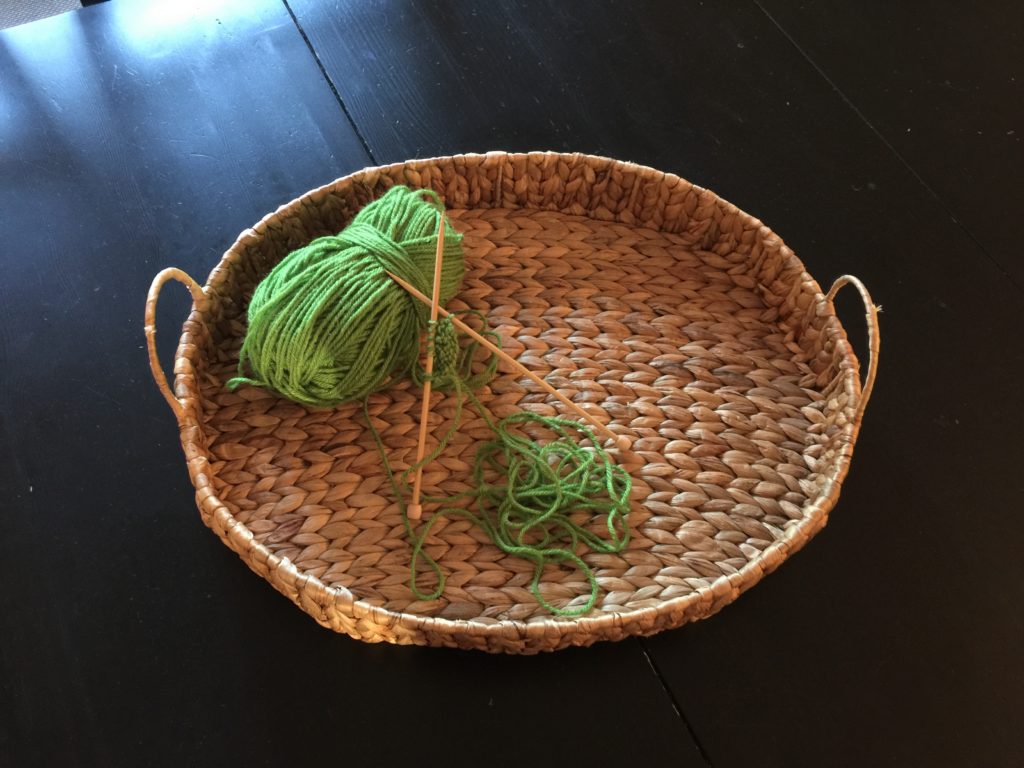I recently experienced a phenomenon in our homeschool that offers great parallel truth for our spiritual lives. “Handiwork” is one of our school subjects, and for this year I wanted to focus on knitting, with a lesson once a week. One of the goals of formal handiwork instruction is that in time the students are able and eager to pick up that work whenever they desire during their leisure time. I learned to knit a couple of years ago, and I have found such delight in the occupation. It is both relaxing and rewarding to be in the middle of a piece of knitting work, slowly seeing an object begin to take shape with the repetition of every rhythmic click of the needles. To me, this creative occupation is a delight, and it is one that I wanted my children experience for themselves.
However, as you would imagine with 8- and 6-year-old boys, it’s a skill that doesn’t come without effort…tedious effort in the training of fine motor skills. In fact, for the beginner, especially children, the delight is not immediately experienced. There is some pleasure in being able to “cast on” a few stitches to begin a project, but then comes the part that my boys found quite challenging–learning to make the knit stitch. It is the most basic stitch in knitting. In fact, there are many different items one can make using the knit stitch alone. My boys were eager to create their first project, but they couldn’t even begin until they had learned how to make this basic, yet vital stitch.
They quickly became discouraged–and rightly so! To be able to make this stitch, you have to make your hands do several things simultaneously: hold the needles steady in each hand, maneuver the right needle through a stitch on the left needle, pull the working yarn taut with one finger while looping it round the needle, then pulling the wrapped yarn back through the same stitch and slipping it off the needle while holding all the other stitches steady and preventing them from flying off with the one. If you watch an experienced knitter working away, this looks easy as pie. But for the beginning adult, let alone a child, it is extremely hard! It requires such attention, precision, patience, gentleness–all virtues we want to develop in ourselves and our children–but also things that require great effort to attain. In short, the delight of knitting is delayed by the great difficulty of training fine motor skills and practicing patience and perseverance.
We had been working at the knit stitch for a few weeks. I had them watch some videos of people doing it over and over. I also explained and demonstrated it several times. But there are really no short cuts. They had to have the work in their own hands and keep trying over and over again, until they would get. In the lesson this past week, I was sitting at the table with both of them, my hands over their hands, slowly helping them work through each step. Gradually (and with a great deal of testing to my own patience), I was able to let go and let my 8-year-old make the movements himself, until finally he shouted in triumph–“I made a knit stitch!” What satisfaction was his! The thing that had been incredibly painstaking for so long only moments ago had suddenly brought great joy to his heart. In fact, as I had hoped, once he had made a few more stitches successfully, he was eager to spend some of his free time working on it again.

I probably don’t need to draw the parallel for you. As difficulty precedes delight in many rewarding occupations, just so with our own spiritual growth. There are painful seasons of hardship when we have to learn or re-learn virtues, where trust needs to be renewed, or when faith needs strengthened. Delight comes in our spiritual lives when we are able to rest in the love of our faithful Father and abandon ourselves to trust in his divine providence at work in our lives. But we don’t get there without effort, without difficulty. We will experience the tedious work of the spiritual life throughout this pilgrim journey, but we can be assured of the delight that will be ours in the presence of our Lord, as we continually seek his face and surrender to his loving, perfect will.
Copyright 2019 Jessica Ptomey

 Today in the liturgical year we celebrate the life of a young saint who lived in Italy during the turn of the 20th century. This was a hard-working little girl from a poor farming family, whose father died when she was nine, requiring her family to move in with another family. When she was 11, one of the sons of the family they lived with, Alessandro, made sexual advances toward her. When she refused him, he stabbed her 14 times. As she was dying in the hospital she forgave him. He was imprisoned for 27 years, during which time he had a conversion of heart. When he was released, he begged Maria’s mother’s forgiveness — which she granted — and he became a lay brother in a monastery later in life.
Today in the liturgical year we celebrate the life of a young saint who lived in Italy during the turn of the 20th century. This was a hard-working little girl from a poor farming family, whose father died when she was nine, requiring her family to move in with another family. When she was 11, one of the sons of the family they lived with, Alessandro, made sexual advances toward her. When she refused him, he stabbed her 14 times. As she was dying in the hospital she forgave him. He was imprisoned for 27 years, during which time he had a conversion of heart. When he was released, he begged Maria’s mother’s forgiveness — which she granted — and he became a lay brother in a monastery later in life.![By Andreas Trepte (Own work) [CC BY-SA 2.5 (http://creativecommons.org/licenses/by-sa/2.5)], via Wikimedia Commons](https://jessicaptomey.files.wordpress.com/2016/09/snowfinch.jpg?w=300)